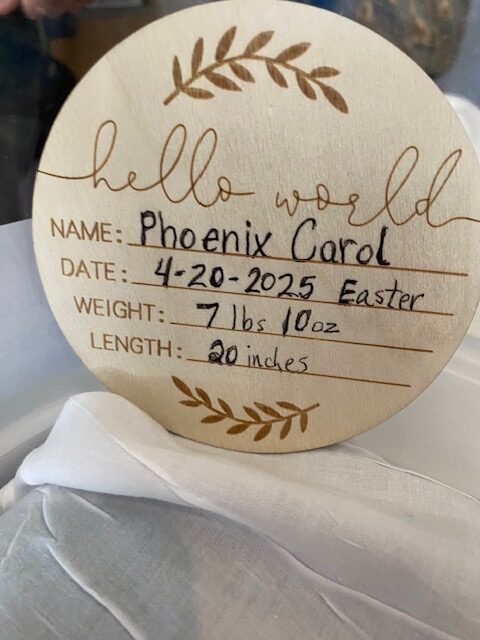The Lord has a way of speaking clearly in life’s most ordinary places. And sometimes, in the most extraordinary ones, too—like a hospital room as your wife labors to bring your ninth child into the world.
There I sat—Bible open, phone silent—carrying a mixture of anticipation and a quiet guilt that Kati was having to go through this pain again. This child was a complete surprise. We weren’t planning on a ninth. But here we were. Kati, enduring each wave of labor with a determination I’ll never understand, was preparing to do again what she’s done seven times before: welcome life.
And I read. It paled in comparison to what she was enduring, but this was my small contribution—or maybe my way of managing the anxiousness increasing in my heart.
Not because I had a sermon to prepare. Not because I needed content for a blog. But because I needed to steady my soul with promises older and stronger than me. I pulled up the Scriptures on children.
“Behold, children are a heritage from the Lord,
the fruit of the womb a reward…” (Psalm 127:3)
I had read it countless times before. Quoted it at dedications. Recited it in debates about the sanctity of life. But in that moment, it wasn’t merely theology to be taught—it was truth to be clung to.
That verse led me to another—from Hannah, as she gave her long-prayed-for son back to the Lord:
“For this child I prayed, and the Lord has granted me my petition… Therefore I have lent him to the Lord.” (1 Samuel 1:27–28)
What does it mean to “lend” a child to the Lord? I don’t do well around pain—even the pain of others. So, I distracted myself with that question. I didn’t need the answer in that moment. But the older I get, the more I realize: these children are gifts. None of them earned. None of them truly ours in the deepest sense. Each one lent. Each one a reminder of covenant mercy.
As Thomas Manton wrote,
“Surely parents should acknowledge God in every child given to them… It is a thing wherein God will have His bounty taken notice of by solemn praises; and for every child, God should have a new honour from you. What hath been done to the Lord for this? Therefore do not look upon the birth of a child as a natural thing; see God in it.”
Indeed—what has been done for me to deserve this mercy? Truly, this was more than a natural thing. More and more, I see God in it.
One verse connected to another, then to another…
“Your children will be like olive shoots around your table… thus shall the man be blessed who fears the Lord.” (Psalm 128:3–4)
“The children whom God has graciously given your servant.” (Genesis 33:5)
“Let the little children come to me… for to such belongs the kingdom of God.” (Mark 10:14)
This ninth child—just like the first—is no less a blessing. No less a gift. No less a call to trust God’s heart in His plan. As one Puritan wrote, “God loveth not to take a single person, but grace cometh to our houses: Acts 16:31, ‘Believe in the Lord Jesus, and thou shalt be saved, thou and thy house.’”
And no less a testimony to God’s kindness, not our competence.
Our culture may not understand large families. Even in the church, we can forget that children are not burdens to be managed, but blessings to be stewarded. That’s why the sound of a baby crying or a toddler squealing with delight during worship should not be seen as a disruption, but as a sign of life. These sounds are reminders that the church is growing, that God is keeping His promises from generation to generation. A quiet sanctuary may feel orderly, but one filled with the joyful noise of children is filled with evidence of God’s covenant faithfulness.
I’ve lost count of how many times Kati and I, especially in our younger years, walked through the grocery store with our small parade of children trailing behind us—only to be stopped by someone asking, wide-eyed, “Are they all yours?!”
I’ve often wanted to respond with a straight face, “No, I just go around the neighborhood collecting kids and asking if they’d like to come grocery shopping.”
The looks would be priceless—but so is the moment. Questions like these often come from genuine curiosity, but they also remind us how uncommon it’s become to see children as a blessing. A full home, once a familiar sign of God’s kindness, now often draws surprise. And yet, Scripture reminds us:
“Children are a heritage from the Lord.”
Children are not trophies. They are not projects.
They are souls—eternal souls—entrusted to broken, forgiven parents who must look daily to the grace of Christ.
As I looked at my wife, laboring, and later as I held our newborn in my arms, my attention shifted from the pages of Scripture to the living documents before me. She was embodying the verses I just read. Her quiet strength, steady endurance, and unwavering faithfulness were not abstract virtues, but flesh-and-blood reality. She was living out the truth that children are a heritage from the Lord—not with words, but with her whole being.
And surrounding her were others—nurses, doctors, and caretakers—who, whether knowingly or not, were helping to bring these truths to pass. Their skill, competence, and compassionate care were instruments of mercy. Through them, I saw the kindness of God in action. It was a moment where common grace met covenant grace, and I was reminded that even in sterile hospital rooms, the providence of God is never absent. He weaves His goodness through trained hands and wise decisions as much as through prayers whispered and Scriptures read.
In those moments, I was confronted by faithfulness I could not exemplify—only admire. The Scriptures I had meditated on became visible.
And so, in that hospital room—eighth time around but still full of wonder—I found myself praying a similar prayer I’ve prayed with every child before:
“Lord, thank You. Make me faithful. Make us faithful. Help us raise this child to know and love You. Show us Your kindness and mercy.”
Because in the end, it’s not about the number of children, or the reactions in grocery store aisles, or the logistics of a van that fits eleven. It’s about covenant faithfulness. It’s about the God who calls Himself our Father and invites us to trust Him with the lives He gives.
Nine children.
Nine blessings.
Nine reasons to say again, with a full heart:
“Behold, children are a heritage from the Lord.”

